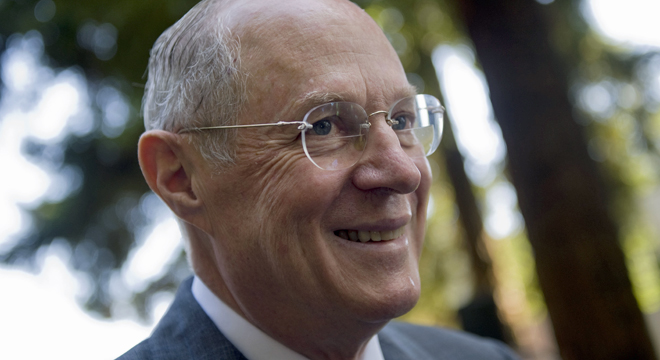When the Supreme Court takes up two major cases on marriage equality next spring, all eyes will be on an ever-important swing vote whom gay rights advocates are optimistic about winning: Justice Anthony Kennedy.
The Reagan-appointed justice has pained liberals on many occasions, most recently this summer when he voted to wipe out the Affordable Care Act. But when it comes to gay rights, Kennedy has written passionately in its favor, spearheading the court’s two key rulings for gay equality.
“I expect Justice Kennedy to vote in favor of marriage equality,” said Erwin Chemerinsky, a constitutional law professor at the University of California, Irvine School of Law.
“There have been two decisions in American history expanding rights for gays and lesbians: Romer v. Evans and Lawrence v. Texas. Anthony Kennedy wrote the opinion for the Court in both,” Chemerinsky told TPM by email. “He knows where history is going and that he faces the choice between writing the next Plessy v. Ferguson and the next Brown v. Board of Education. He wants to be on the right side of history.”
Lucas Powe, a Supreme Court historian at the University of Texas, Austin School of Law, agreed. “I think Kennedy’s vote is very secure,” he told TPM. “Kennedy has a libertarian streak — he has written the key gay rights opinions and I think he will continue to do so.”
In the 2003 Lawrence case, the high court struck down laws banning same-sex sodomy among consenting adults. Memorably for gay advocates, Kennedy’s majority opinion emphasized that gays may not be stripped of “their dignity as free persons.”
“When sexuality finds overt expression in intimate conduct with another person, the conduct can be but one element in a personal bond that is more enduring,” he wrote. “The liberty protected by the Constitution allows homosexual persons the right to make this choice.”
The decision built on Kennedy’s 1996 majority opinion in Romer, when the same six justices held that Colorado and other states are not permitted to enact laws prohibiting local protections for gays and bisexuals against discrimination.
“[T]he amendment imposes a special disability upon those persons alone. Homosexuals are forbidden the safeguards that others enjoy or may seek without constraint,” Kennedy declared in Romer. “It is not within our constitutional tradition to enact laws of this sort.”
“A State cannot so deem a class of persons a stranger to its laws,” the justice concluded.
Kennedy’s Lawrence and Romer opinions both relied on the Constitution’s guarantee of equal protection under the law. He made clear in Lawrence that the ruling does not apply to marriage laws, leaving his options open, but Justice Antonin Scalia warned otherwise. And it’s those two precedents that challengers to the Defense of Marriage Act and California’s Proposition 8 will invoke to decree laws against gay marriage unconstitutional.
“Justice Kennedy has authored two powerful, eloquent, and compelling rulings,” said Evan Wolfson, executive director of Freedom To Marry, “that will be central to the Windsor case, which challenges the ‘gay exception’ to the way the federal government ordinarily respects lawful marriages for federal purposes, and the Perry case, which seeks to restore the freedom to marry stripped away from gay couples by California’s Prop 8.”






